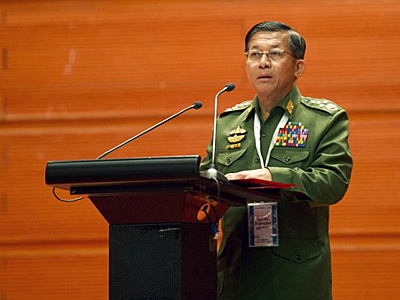




Myanmar’s president-elect Htin Kyaw on Thursday submitted a proposal to parliament to reduce the number of government ministries to 21 from 36 and create a new ethnic affairs ministry in keeping with Aung San Suu Kyi’s pledge to make government leaner and more inclusive.
Under the plan, which lawmakers will begin debating on Friday, the six ministries under the President’s Office would be combined into one, while other ministries would be eliminated or merged.
The Information Ministry, the mouthpiece of the current government under President Thein Sein’s military-backed Union Solidarity and Development Party, would remain in place.
“We had 36 ministries, but not every ministry had work to do,” said Khin San Hlaing, a lawmaker from the National League for Democracy (NLD). “Some had a lot of work, but others just had a few projects. I’m happy because now we can use less money from the budget to fund fewer ministries.”
The new ministries will be established after Htin Kyaw, NLD chairwoman Aung San Suu Kyi’s proxy president, is sworn in on March 30.
The NLD has said that no workers will be laid off in the ministry reshuffle, although last week it indicated that some civil servants would have to undergo training.
“As Daw [honorific] Aung San Suu Kyi already said, government workers don’t need to worry,” said NLD lawmaker Tun Tun Hein. “Although some ministries are merging, the staff will be reshuffled at suitable ministries.”
Ethnic affairs ministry
The only new ministry will be responsible for ethnic affairs and was created to realize Aung San Suu Kyi’s plan for peace and national reconciliation by bringing together diverse ethnic minority groups and ending the fighting between some of the armed ethnic groups and the government army.
Leaders of ethnic political groups hailed the move.
“It is very good to have the Ministry of Ethnic Affairs because we need to work on national reconciliation and ethnic unity,” said Tu Ja, chairman of the Kachin State Democracy Party.
Naing Han Thar, chairman of the Mon New State Party, said the ministry would forge better relations among ethnic groups.
“It’s good to have this Ethnic Affairs Ministry that can build trust among all ethnics,” he said.
Each of Myanmar’s 14 states and regions already has an ethnic affairs minister. But the ethnic groups themselves want the most suitable one among them, and who is not a member of the dominant ethnic Bamar group, to be the national ethnic affairs minister, said Saw Than Myint, chairman of the Federal Union Party, which includes former members of 16 ethnic political parties and is influential in northern Myanmar’s Shan state.
The government army has clashed with armed ethnic groups in Shan, northern Kachin, and western Rakhine states in recent months, forcing tens of thousands of civilians to flee their homes. Hostilities also have ensued between different ethnic militias in certain parts of the country.
“The most important problem in our country is fighting between military and armed ethnic groups,” said Naing Soe Myint, secretary of the Mon National Party. “The Ministry of Ethnic Affairs should solve this problem first.”
The current government signed a nationwide cease-fire agreement with eight armed ethnic groups last October, but several other groups either refused to join the pact or were excluded from it because of their clashes with the national army.
“We don’t have peace in our country because of the conflicts between Burmese [army] and ethnic groups,” said lawmaker Ba Shein of the Arakan National Party. “People will have hope if the new Ministry of Ethnic Affairs can do something for building peace. That ministry could do something for peace if the new government gives it the authority to do so.”

The NLD, which will take over the government on April 1, will nominate 18 ministers, while military commander-in-chief Senior General Min Aung Hlaing, will nominate the remaining three for the ministries of defense, home affairs and border affairs in accordance with Myanmar’s constitution, which was written in 2008 when a military junta governed the country.
The names of the ministers will be announced after March 20, said NLD spokesman Zaw Myint Maung.
Aung San Suu Kyi has long been at odds with the military, which opposed changes she wanted to make to the constitution that would have reduced its power in parliament and allowed her to become president.
She is barred from the top office by a constitutional provision inserted by the military when the junta ruled the country, which prohibits anyone with foreign-born relatives from becoming president.
She has met with Min Aung Hlaing three times since the NLD won national elections last November to discuss the transfer of power to the new government led by her party, although pundits speculated that the meetings were ineffectual.
Nevertheless, some observers believe that Htin Kyaw and other NLD lawmakers will not oppose Min Aung Hlaing’s ministerial nominations.
“I think there is less possibility for the president and Union parliament to reject the names of these ministers which military chief will nominate, because Daw Aung San Suu Kyi has made building trust with the military a priority now,” said political commentator Yan Myo Thein.
Reported by Win Naung Toe, Win Ko Ko Latt, Thinn Thiri and Wai Mar Tun for RFA’s Myanmar Service. Translated by Khet Mar. Written in English by Roseanne Gerin.